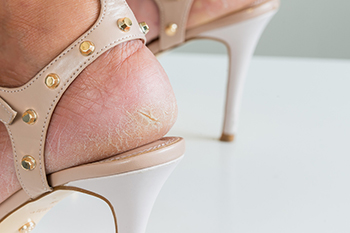
The winter months can cause the skin on the heels to become dry and ultimately crack. It can cause pain and discomfort, and deep cracks which are known as fissures, may bleed and become infected. Cracked heels can also develop during the summer months, and this may be a result of wearing shoes that have an open back, such as flip-flops or sandals. Additionally, there may be existing medical conditions that can cause cracked heels. These can include eczema and psoriasis, which may cause a lack of moisture in the skin. The moisture levels in the skin may also be affected by using hot water from taking a hot shower. Replenishment of these levels can increase by drinking plenty of water daily, in addition to consuming hydrated foods. People who have diabetes may be prone to developing cracked heels. Neuropathy, which is a common condition among diabetic patients, may cause the skin to lose moisture, possibly resulting in this uncomfortable foot condition. If you have developed cracked heels, it is suggested that you consult with a podiatrist who can help you to find permanent relief, by possibly prescribing medicine.
If the skin on your feet starts to crack, you may want to see a podiatrist to find treatment. If you have any concerns, contact one of our podiatrists from Family Foot and Ankle Care of Moriches. Our doctors can provide the care you need to keep you pain-free and on your feet.
Cracked Heels
It is important to moisturize your cracked heels in order to prevent pain, bleeding, and infection. The reason cracked heels form is because the skin on the foot is too dry to support the immense pressure placed on them. When the foot expands, the dry skin on the foot begins to split.
Ways to Help Heal Them
- Invest in a good foot cream
- Try Using Petroleum Jelly
- Ease up on Soaps
- Drink Plenty of Water
Ways to Prevent Cracked Heels
- Moisturize After Showering
- Skip a Shower
- Keep Shower Water Lukewarm
- Don’t Scrub Your Feet
If you are unsure how to proceed in treating cracked heels, seek guidance from a podiatrist. Your doctor will help you with any questions or information you may need.
If you have any questions, please feel free to contact our offices located in Moriches and Shirley, NY . We offer the newest diagnostic and treatment technologies for all your foot care needs.



